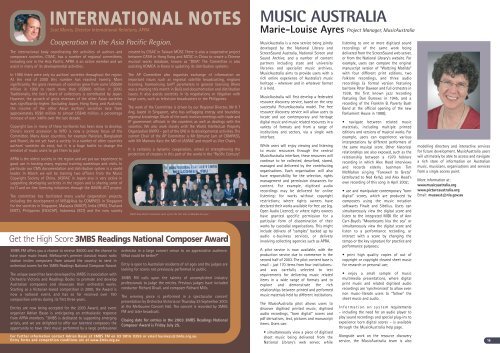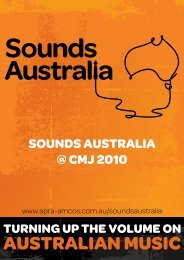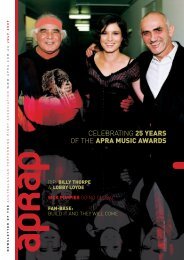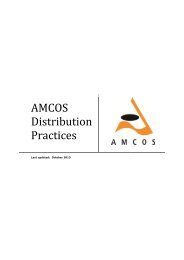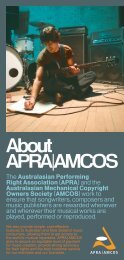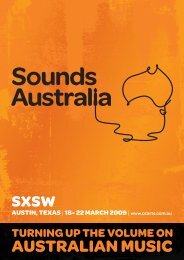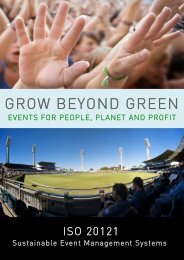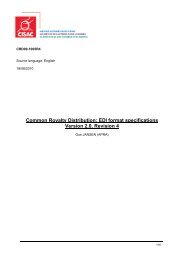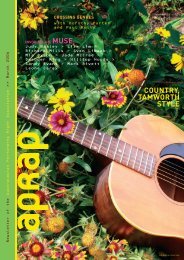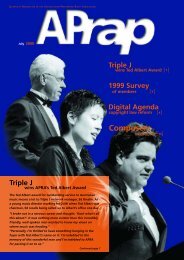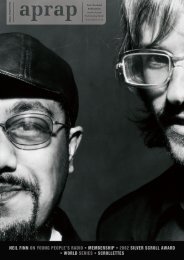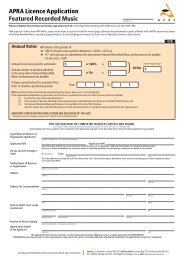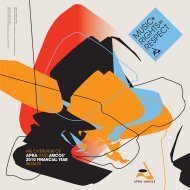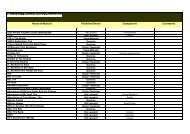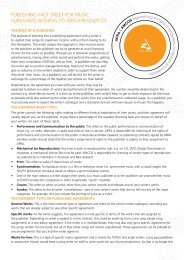director of nz - APRA
director of nz - APRA
director of nz - APRA
You also want an ePaper? Increase the reach of your titles
YUMPU automatically turns print PDFs into web optimized ePapers that Google loves.
INTERNATIONAL NOTES<br />
Scot Morris, Director International Relations, <strong>APRA</strong><br />
Cooperation in the Asia Pacific Region.<br />
The international body coordinating the activities <strong>of</strong> authors and<br />
composers societies, CISAC, has a number <strong>of</strong> regional committees,<br />
including one in the Asia Pacific. <strong>APRA</strong> is an active member and we<br />
assist in many <strong>of</strong> its developmental activities.<br />
In 1980 there were only six authors' societies throughout the region.<br />
At the end <strong>of</strong> 2000 this number has reached twenty. More<br />
significantly, the gross revenues <strong>of</strong> societies grew from some US$500<br />
million in 1990 to reach more than US$900 million in 2000.<br />
Traditionally, the lion's share <strong>of</strong> collections is contributed by Japan.<br />
However, the growth <strong>of</strong> gross revenues <strong>of</strong> the other Asian societies<br />
was significantly higher. Excluding Japan, Hong Kong and Australia,<br />
the income <strong>of</strong> the other Asian authors' societies rose from<br />
approximately US$9 million to almost US$40 million, a percentage<br />
increase <strong>of</strong> over 340% over the last decade.<br />
Copyright law in many <strong>of</strong> these territories has been slow to develop.<br />
China's recent accession to WTO is now a primary focus <strong>of</strong> the<br />
Committee. Many Asian countries, for example Pakistan, Bangladesh<br />
and Brunei, do not yet have a society. In a number <strong>of</strong> other countries<br />
authors' societies do exist, but it is a huge battle to change the<br />
mindset <strong>of</strong> music users to get them to pay!<br />
<strong>APRA</strong> is the oldest society in the region and we put our experience to<br />
good use in hosting many regional training workshops and visits. In<br />
particular our CMS documentation and distribution system is a world<br />
leader. In March we will be training two <strong>of</strong>ficers from the Music<br />
Copyright Society <strong>of</strong> China. JASRAC in Japan also is very active in<br />
supporting developing societies in the region and is sharing some <strong>of</strong><br />
its IT and on-line licensing initiatives through the DAWN-ACT project.<br />
The committee has facilitated many useful cooperation projects,<br />
including the development <strong>of</strong> MIS@Asia by COMPASS in Singapore<br />
for the societies in Singapore, Malaysia (MACP), India (IPRS), Thailand<br />
(MCT), Philippines (FILSCAP), Indonesia (KCI) and the new society<br />
created by CISAC in Taiwan MÜST. There is also a cooperative project<br />
between CASH in Hong Kong and MCSC in China to create a Chinese<br />
musical works database, known as “DIVA”. The Committee is also<br />
assisting KOMCA in Korea in updating its distribution systems.<br />
The AP Committee also organises exchange <strong>of</strong> information on<br />
important issues such as regional satellite broadcasting, ringtone<br />
licensing, harmonising tariff parameters in general licensing (there<br />
was a meeting this month in Bali) and documentation and distribution<br />
issues. It also assists societies in its negotiations or litigation with<br />
large users, such as television broadcasters in the Philippines.<br />
The work <strong>of</strong> the Committee is driven by our Regional Director, Mr K T<br />
Ang, based in Singapore, who has unflagging energy and boundless<br />
regional knowledge. Much <strong>of</strong> the work involves meetings with trade and<br />
IP government <strong>of</strong>ficials in the countries as well as dealings with the<br />
societies. We also work closely with the World Intellectual Property<br />
Organisation (WIPO – part <strong>of</strong> the UN) in its developmental activities. The<br />
current Chair <strong>of</strong> the AP Committee is Mr Edmund Lam <strong>of</strong> COMPASS,<br />
with Mr Mamoru Kato the MD <strong>of</strong> JASRAC and myself as Vice Chairs.<br />
It is certainly a dynamic cooperation, aimed at strengthening the<br />
protection <strong>of</strong> creators in this part <strong>of</strong> the world in the “Pacific Century”.<br />
Get the High Score 3MBS Readings National Composer Award<br />
3MBS FM <strong>of</strong>fers you a chance to receive $6000 and the chance to<br />
have your music heard. Melbourne’s premier classical music radio<br />
station invites composers from around the country to send in<br />
orchestral scores for the 3MBS Readings National Composer Award.<br />
The unique award has been developed by 3MBS in association with<br />
Orchestra Victoria and Readings Books to promote and develop<br />
Australian composers and showcase their orchestral works.<br />
Starting as a Victorian-based competition in 2000, the Award is<br />
now a national event, and has so far received over 150<br />
composition entries during its first three years.<br />
Entries are now being accepted for the 2003 Award, and event<br />
organiser Adrian Basso is anticipating an enthusiastic response<br />
from <strong>APRA</strong> members. “3MBS is dedicated to supporting emerging<br />
artists, and we are delighted to <strong>of</strong>fer our talented composers the<br />
opportunity to have their music performed by a large pr<strong>of</strong>essional<br />
CISAC Asia-Pacific Committee meet up for the first time in Mumbai last year<br />
orchestra in a large concert venue to an appreciative audience.<br />
What could be better?”<br />
Entry is open to Australian residents <strong>of</strong> all ages and the judges are<br />
looking for scores not previously performed in public.<br />
3MBS FM calls upon the talents <strong>of</strong> accomplished industry<br />
pr<strong>of</strong>essionals to judge the entries. Previous judges have included<br />
conductor Richard Divall, and composer Richard Mills.<br />
The winning piece is performed in a spectacular concert<br />
presentation by Orchestra Victoria on Thursday 25 September 2003<br />
at the Melbourne Concert Hall. The concert is recorded by 3MBS<br />
FM and later broadcast.<br />
Closing date for entries in the 2003 3MBS Readings National<br />
Composer Award is Friday July 25.<br />
For further information contact Adrian Basso at 3MBS FM on 03 9816 9355 or email business@3mbs.org.au.<br />
Entry forms and competition conditions are at www.3mbs.org.au<br />
MUSIC AUSTRALIA<br />
Marie-Louise Ayres Project Manager, MusicAustralia<br />
MusicAustralia is a new service being jointly<br />
developed by the National Library and<br />
ScreenSound Australia, National Screen and<br />
Sound Archive, and a number <strong>of</strong> content<br />
partners including state and university<br />
libraries and specialist music archives.<br />
MusicAustralia aims to provide users with a<br />
rich online experience <strong>of</strong> Australia’s music<br />
heritage – wherever and in whatever format<br />
it is held.<br />
MusicAustralia will first develop a federated<br />
resource discovery service, based on the very<br />
successful PictureAustralia model. The free<br />
resource discovery service will allow users to<br />
locate and use contemporary and heritage<br />
digital music and music related resources in a<br />
variety <strong>of</strong> formats and from a range <strong>of</strong><br />
institutions and sectors, via a single web<br />
interface.<br />
While users will enjoy viewing and listening<br />
to music resources through the central<br />
MusicAustralia interface, these resources will<br />
continue to be collected, described, stored,<br />
managed and delivered by the contributing<br />
organisations. Each organisation will also<br />
have responsibility for the selection, rights<br />
management and permission clearances for<br />
content. For example, digitised audio<br />
recordings may be delivered for online<br />
listening: for works without copyright<br />
restrictions; where rights owners have<br />
declared their works available for free use (eg.<br />
Open Audio Licence); or where rights owners<br />
have granted specific permission for a<br />
particular form <strong>of</strong> dissemination <strong>of</strong> their<br />
works by custodial organisations. This might<br />
include delivery <strong>of</strong> “samples” backed up by<br />
audio e-business services, or delivery<br />
involving collecting agencies such as <strong>APRA</strong>.<br />
A pilot service is now available, with the<br />
production service due to commence in the<br />
second half <strong>of</strong> 2003. The pilot content base is<br />
small – just 170 items from four institutions–<br />
and was carefully selected to test<br />
requirements for delivering music related<br />
items in a wide range <strong>of</strong> formats and to<br />
explore and demonstrate the rich<br />
relationships between printed and performed<br />
music materials held by different institutions.<br />
The MusicAustralia pilot allows users to<br />
discover digitised printed music, digitised<br />
audio recordings, “born digital” scores and<br />
pdf derivatives, text, pictures and manuscript<br />
items. Users can:<br />
• simultaneously view a piece <strong>of</strong> digitised<br />
sheet music being delivered from the<br />
National Library’s web server, while<br />
listening to one or more digitised sound<br />
recordings <strong>of</strong> the same work being<br />
delivered from the ScreenSound web server,<br />
or from the National Library’s website. For<br />
example, users can compare the original<br />
manuscript version <strong>of</strong> “Waltzing Matilda”<br />
with four different print editions, two<br />
folklore recordings, and three audio<br />
recordings (a formal version featuring<br />
baritone Peter Dawson and full orchestra in<br />
1938, the first known jazz recording<br />
featuring Don Burrows in 1945, and a<br />
recording <strong>of</strong> the Franklin B. Paverty Bush<br />
Band at the <strong>of</strong>ficial opening <strong>of</strong> the new<br />
Parliament House in 1988);<br />
• navigate between related music<br />
materials, including multiple printed<br />
editions and versions <strong>of</strong> musical works. For<br />
example, users can experience various<br />
interpretations by different performers <strong>of</strong><br />
the same musical score. Other historical<br />
relationships are also exposed, such as the<br />
relationship between a 1970 folklore<br />
recording in which Alex Hood interviews<br />
and records elderly bushman Tim<br />
McMahon singing “Farewell to Greta”<br />
(attributed to Ned Kelly), and Alex Hood’s<br />
own recording <strong>of</strong> this song in April 2002;<br />
• use and manipulate contemporary “born<br />
digital” scores, which are produced by<br />
composers using the music notation<br />
s<strong>of</strong>twares Finale and Sibelius. Users can<br />
simultaneously view the digital score and<br />
listen to the integrated MIDI file <strong>of</strong> Ann<br />
Carr-Boyd’s “Moonbeams kiss the sea” or<br />
simultaneously view the digital score and<br />
listen to a performance recording, or<br />
interact with a score by changing the<br />
tempo or the key signature for practice and<br />
performance purposes;<br />
• print high quality copies <strong>of</strong> out <strong>of</strong><br />
copyright or copyright cleared sheet music<br />
for research or personal use;<br />
• enjoy a small sample <strong>of</strong> music<br />
multimedia presentations, where digital<br />
print music and related digitised audio<br />
recordings are ‘synchronised’ to allow even<br />
non music-literate users to “follow” the<br />
sheet music and audio.<br />
Information on system requirements<br />
– including the need for an audio player to<br />
play sound recordings and special plug-ins to<br />
experience born digital scores – is available<br />
through the MusicAustralia help page.<br />
Alongside work on the resource discovery<br />
service, the MusicAustralia team is also<br />
modelling <strong>director</strong>y and interactive services<br />
for future development. MusicAustralia users<br />
will ultimately be able to access and navigate<br />
a rich store <strong>of</strong> information on Australian<br />
music, musicians, organisations and services<br />
from a single access point.<br />
More information at:<br />
www.musicaustralia.org<br />
www.pictureaustralia.org<br />
Email: musaust@nla.gov.au<br />
16


